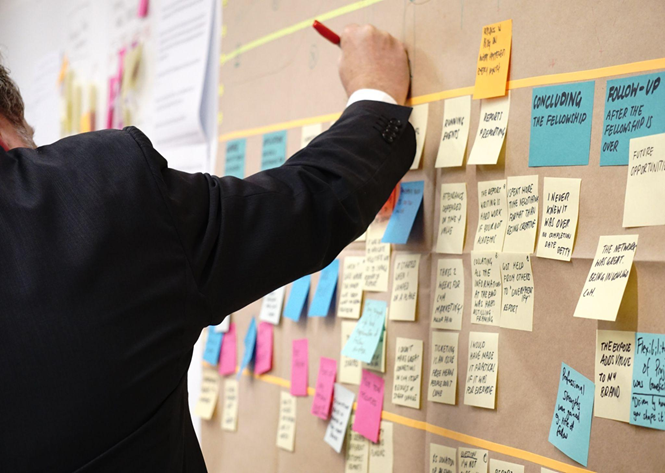Project management essentials represent step-by-step instructions on how to complete projects successfully, on time, and on budget. Poor project management will cost you more than just money.


Project management essentials represent step-by-step instructions on how to complete projects successfully, on time, and on budget. Poor project management will cost you more than just money. When deadlines and budgets are missed, it harms your reputation, self-assurance, and client trust irreparably.
Here we discuss the top 5 project management essentials for a successful project, how to implement them, and how they can benefit you and your whole team. Let’s dive in!
Project management is the use of procedures, methods, techniques, abilities, knowledge, and experience to accomplish particular project goals in accordance with predetermined guidelines. Such management is determined in terms of budget and time.
When done correctly, project management makes every aspect of the business work more efficiently. Your team can concentrate on the important work without being distracted by unmanageable budgets or projects that grow out of hand.

If there are delivery delays, companies risk losing customers, which can harm the whole company. Project managers can help companies achieve their goals efficiently and on time by designing the project plan. As a result, the teams working on the project have a clear vision that is aligned with the company's objectives.
Aside from creating the project plan, project managers are also in charge of project scope documents and costs in order to avoid distractions for the designated team. To avoid risks, they schedule tasks appropriately and report progress to leaders so risks can be addressed quickly and effectively.
The project lifecycle represents the stages involved in a project's progress. It includes:
The first step is project initiation. In this phase, project managers determine the project's objectives and overall scope. A project manager looks for and identifies vital stakeholders during this phase while defending the funding for the project.
Project initiation can include numerous sub-activities, such as identifying the scope, project stakeholders, and deliverables, drafting a statement of work, and determination of initial costs. All of these activities can easily be determined by using the technology for efficient project management.

Once the initiation is done, we move to definition and planning. In this phase, managers create a project plan, which includes the project's tasks, schedule, resources, and constraints. In this stage, project managers establish the project budget, identify potential risk, and prepare necessary mitigation strategies. Along the way, managers can use manager feedback tools in order to keep each other updated and notify one another of possible errors and risks.
The majority of the work on a project is done in this phase. Project managers make adjustments depending on unforeseen changes that arise throughout the project and ensure that designated tasks are done in line with the established timetable.
Say your social media marketing campaign is kicking off to promote your new event. During the execution of the campaign, you need to be able to track the progress across all platforms, analyze the results, and improve with each step.
In this phase, project managers can use different project manager tools. Usually, they use specific Key Performance Indicators (KPIs) to monitor the progress of the project. They adjust the plan where necessary based on the ongoing results of this measurement.
Pro Tip: When you kick off a project to introduce your new product to the customers, iterations of your project development will include receiving feedback and ideas from the audience directly. Optimize this process by using tools such as a feature request tracker to navigate through information easily and prepare the next generation of your product.
A project is closed once the team has completed all tasks and the project owner has signed off on all deliverables. During the course of a project, project managers must prepare resources and budget utilization reports as well as lists of tasks that were not completed. Once the project is evaluated for performance, it is determined if the project's goals were met.

Let’s identify the essentials for successful project management and what kind of tactics, tools, methods, and project management software you need to use!
The project cannot be successful if there’s no successful collaboration. Thus the right collaboration tools are essential when working on projects. Collaboration tools make it much easier for people to stay in touch and communicate.
Rather than relying on email for communication, collaboration tools allow people to know the progress of tasks and deliverables in real-time. Integration tools help keep teams in sync by integrating disparate systems in a flexible and autonomous way. Such tools are especially important when there’s a need for staff augmentation due to the increased number of employees on one project.
The Gantt Chart is the most popular project management tool. It organizes every little detail on your project. The tool's charts let project managers properly allocate resources and time for milestones and deliverables.
It helps recognize limitations and, more importantly, adjust deliverables accordingly. Also, in a Gantt chart, links between tasks can be automatically adjusted if one task is delayed.

The baseline represents the standard you set for your project against the actual performance of the project. The project baseline is a project management tool for scoping, costing, and scheduling projects. Your baseline enables you to monitor your ongoing improvement.
At its essence, project management is all about ensuring that all the moving parts reach the right people at the appropriate times.Keeping things organized on an individual basis is essential, but it's even more beneficial to have a workflow software that keeps things going smoothly and as effectively as possible.
Use one tool to assign, automate, track, and train. Some advantages include more accountability, improved consistency, fewer mistakes, less time spent looking for solutions, and quicker training.
Team activities can bring a bit of fun, improve morale, and boost energy and productivity in a team member all at once. Furthermore, it can motivate team members to work together to find the best possible solutions by encouraging creativity and highlighting their talents. Such activities are great for bonding together and stepping out from all those project tasks to gain motivation and inspiration.
Project management is ubiquitous in almost all organizations and companies. But in order to complete a successful project, each business will need project management essentials.
Using such tools will clearly define goals and project management processes. Thus, organizations that use project management tools are more likely to achieve their objectives and hit their sales targets.






